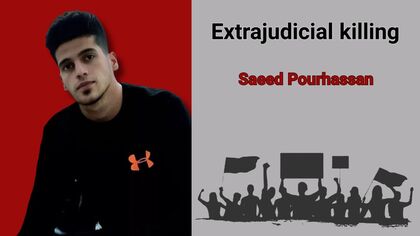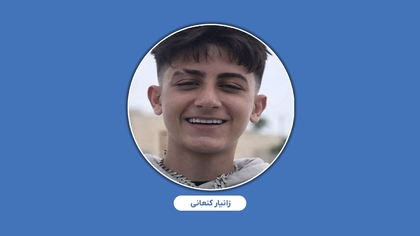Emo Teens Killed in Iraq at Alarming Rate
20:54 - 13 March 2012

KURDPA - “Emo” is now a term used in Baghdad to refer to young men who dress and act in a hip-hop style. This trend has become popular among teenagers between 12 and 17 years old.
They dress in dark colors and tight leather pants with English words printed on them. They also wear necklaces and bracelets.
Usama Samir, 20, says the Iraqi government isn’t able to protect the lives of its own people.
“I am talking to the State of Law Coalition (Prime Minister Nuri Maliki’s bloc),” he said. “Is there really law in Iraq? Where is the law that protects people? Where is law, State of Law? If you can’t protect people, then why do you rule them?”
According to different news reports, the number of emo teenagers killed in Baghdad has reached 100. But the Ministry of the Interior denied any connection between the emo youth and the 15 dead bodies found recently in Baghdad.
Nashwan Imad, 16, is a secondary school student in Baghdad and a fan of rap music. He and his friends imitate the style of American rappers, but nowadays he does not dare to step outside his house for fear of getting killed.
“We cannot attend our club anymore because of these murders,”
“We cannot attend our club anymore because of these murders,” he said. “We used to practice rap music every day after school and I hoped one day we would form a band.”
the Sadrist Movement of Muqtada Sadr released a statement describing emo as “crazy and immoral” and that emo youth were an epidemic that needed to be eradicated legally.
In a statement, the Ministry of the Interior has warned religious groups not to act as moral judges for society as this violates the rights and liberties of others.
“The society itself can reject or accept these trends and families can take care of their children without creating chaos,” read the statement.
The emo youth mainly hang out in Baghdad’s Karrada neighborhood and Palestine Street where there are some stores selling clothes, shoes and other hip-hop materials.
Human rights activist Huda Rahman said, “We know those teenagers who got killed did not commit any crimes. Even if what they did was a crime, shouldn’t the law be the method to deal with it? The government is responsible to protect the lives of the people.”
Rahman added, “The government has a responsibility to implement the constitution which guarantees the rights and freedoms for people, including freedom of political and religious speech and other freedoms.”
Psychologist Shamil Ayshu told Rudaw that the emo trend has been in Baghdad for more than two decades, but only became popular recently.
“It emerged in the 1990s when some bands were singing emotional songs to attract people’s attention,” Ayshu said. “Many teenagers and children who had family problems were influenced by it. These bands have unique costumes, and the suppressed emotions and frustration among teenagers nowadays is the reason they are mimicking these imported habits.”
They dress in dark colors and tight leather pants with English words printed on them. They also wear necklaces and bracelets.
Usama Samir, 20, says the Iraqi government isn’t able to protect the lives of its own people.
“I am talking to the State of Law Coalition (Prime Minister Nuri Maliki’s bloc),” he said. “Is there really law in Iraq? Where is the law that protects people? Where is law, State of Law? If you can’t protect people, then why do you rule them?”
According to different news reports, the number of emo teenagers killed in Baghdad has reached 100. But the Ministry of the Interior denied any connection between the emo youth and the 15 dead bodies found recently in Baghdad.
Nashwan Imad, 16, is a secondary school student in Baghdad and a fan of rap music. He and his friends imitate the style of American rappers, but nowadays he does not dare to step outside his house for fear of getting killed.
“We cannot attend our club anymore because of these murders,”
“We cannot attend our club anymore because of these murders,” he said. “We used to practice rap music every day after school and I hoped one day we would form a band.”
the Sadrist Movement of Muqtada Sadr released a statement describing emo as “crazy and immoral” and that emo youth were an epidemic that needed to be eradicated legally.
In a statement, the Ministry of the Interior has warned religious groups not to act as moral judges for society as this violates the rights and liberties of others.
“The society itself can reject or accept these trends and families can take care of their children without creating chaos,” read the statement.
The emo youth mainly hang out in Baghdad’s Karrada neighborhood and Palestine Street where there are some stores selling clothes, shoes and other hip-hop materials.
Human rights activist Huda Rahman said, “We know those teenagers who got killed did not commit any crimes. Even if what they did was a crime, shouldn’t the law be the method to deal with it? The government is responsible to protect the lives of the people.”
Rahman added, “The government has a responsibility to implement the constitution which guarantees the rights and freedoms for people, including freedom of political and religious speech and other freedoms.”
Psychologist Shamil Ayshu told Rudaw that the emo trend has been in Baghdad for more than two decades, but only became popular recently.
“It emerged in the 1990s when some bands were singing emotional songs to attract people’s attention,” Ayshu said. “Many teenagers and children who had family problems were influenced by it. These bands have unique costumes, and the suppressed emotions and frustration among teenagers nowadays is the reason they are mimicking these imported habits.”



